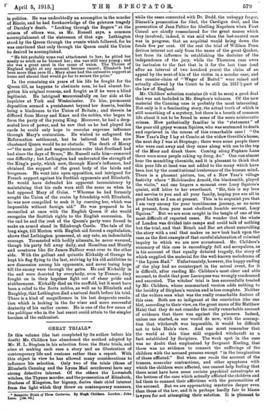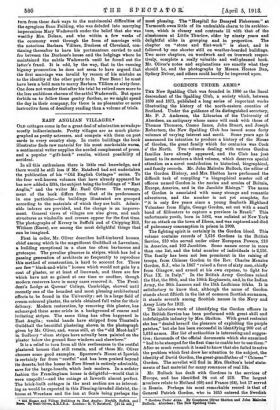GREAT TRIALS.* IN this volume (the last completed by its
author before his death) Mr. Childers has abandoned the method adopted by Mr. H. L. Stephen in his selection from the State trials, and aims at making each case a story and an illustration of contemporary life and customs rather than a report. With this object in view he has allowed many considerations to influence his selection. Only two of the trials (those of Elizabeth Canning and the Lyons Mail murderers) have any strong detective interest. Of the others the Lowestoft witches, the Thynne murder, and the prosecution of Elizabeth, Duehess of Kingston, for bigamy, derive their chief interest from the light which they throw on contemporary manners,
• itentantio Trials of Throo Centuries. By Hugh Childers. London ; John Lane, 02o. 641.]
while the oases connected with Dr. Dodd, the unhappy forger, Disraeli's prosecution for libel, the Cardigan duel, and the prosecution of Jean Peltier for libelling Napoleon when First Consul are chiefly remembered for the great names which they involved; indeed, it was said when the last-named case was in progress, that an acquittal would bring down the funds five per cent. Of the rest the trial of William Penn derives interest not only from the name of the great Quaker, but from its influence in establishing the doctrine of the independence of the jury, while the Thornton case owes its inclusion to the fact that in it for the last time (and after an interval of two hundred years) the claim of an appeal by the next-of-kin of the victim in a murder case, and the counter-claim of "Wager of Battel " were raised and actually allowed by the Court to be still (in 1817 !) part of the law of England.
Mr. Childers' selection contains (it will be seen) a good deal that was not included in Mr. Stephen's volumes. Of the new material the Canning case is probably the most interesting Not only is it a fascinating story, the actual truth of which is still something of a mystery, but there is a breath of common life about it not to be found in some of the more aristocratic crimes. How pathetically familiar is the " statement " of the poor old gypsy woman Squires, who was sentenced to death and reprieved in the course of this remarkable case I "On New Year's Day I lay at Combe at the widow Greville's house, the next day I was at Stoptage ; there were some people there who were cast away and they came along with me to the top of the Moor and drank there. Coming along Popham Lane there were some people raking up dung, Sec." One can almost hear the mumbling chronicle, and it is pleasant to think that this poor life at least was not added to the many which have been lost by the constitutional irrelevance of the human mind. There is a pleasant picture, too, of a New Year's village festivity where " Melchisedec Arnold, the blacksmith, played the violin," and one lingers a moment over Lucy Squires's quaint, stiff letter to her sweetheart. "Sir, this is my love and service to you and all your family, hoping you are all in good health as I am at present. This is to acquaint you that I am very uneasy for your troublesome journey, so no more at present, from your most obedient humble servant, Lucy Squires." But we are soon caught in the tangle of one of the most difficult of reported cases. No wonder that the whole of London was divided into camps and could talk of nothing but the trial, and that Bench and Bar set about unravelling the story with a zeal that makes us no.v look back upon the case as the first example of that careful elaboration of criminal inquiry to which we are now accustomed. Mr. Childers's summary of this case is exceedingly full and scrupulous, as is his account of that equally debated tragedy, the story of which supplied the material for the well-known melodrama of "the Lyons Mail." Unfortunately, however, the happy ending of the play had no counterpart in the actual event, for it is difficult, after reading Mr. Childers's most clear and able account, to doubt that poor Lesurques was wrongly condemned and executed. The witches' trial is less successfully treated by Mr. Childers, whose summarized version adds nothing to the lucidity of Stephen's version and is less complete. Neither of the writers sees what was the really remarkable feature of this case. Both are so indignant at the conviction (the one blot, according to their view, on the great name of Sir Matthew Hale) that they do not consider the really remarkable amount of evidence that there was against the prisoners. Indeed, unless one started, as one would do now, with the assump. tion that witchcraft was impossible, it would be difficult not to take Hale's view. And one must remember that the world at this time still regarded witchcraft as a fact established by Scripture. The weak spot in the case was no doubt that emphasized by Sergeant Keeling, that there was no evidence to connect the sufferings of the children with the accused persons except "in the imagination of those afflicted." But when one reads the account of the trances, muscular contractions, and other symptoms with which the children were affected, one cannot help feeling that there must have been some curious psychical catastrophe at the bottom of the case which actually afflicted the children and led them to connect their a ictions with the personalities of the accused. But we are approaching mysteries deeper even than those of the law, and it is perhaps hardly fair to blame lawyers for not attempting their solution. It is pleasant to
turn from these dark ways to the matrimonial difficulties of the egregious Beau Feilding, who was deluded into marrying impecunious Mary Wadsworth under the belief that she was wealthy Mrs. Deleau, and who within a few weeks of the ceremony went through the form of marriage with the notorious Barbara Villiers, Duchess of Cleveland, con- tinuing thereafter to have his portmanteau carried to and fro between the Duchess's house and the lodgings where be maintained the subtle Wadsworth until he found out the latter's fraud. It is odd, by the way, that in the ensuing bigamy prosecution he does not seem to have argued that the first marriage was invalid by reason of his mistake as to the identity of the other party to it. Poor Beau! be must have been a bold man to marry Barbara Villiers at sixty-four. One does not wonder that after his trial he retired once more to the less ambitious charms of the artful Wadsworth. But space forbids us to follow these gentry further, or we might spend the day in their company, for there is no pleasanter or more instructive form of desultory reading than a volume of trials.















































 Previous page
Previous page